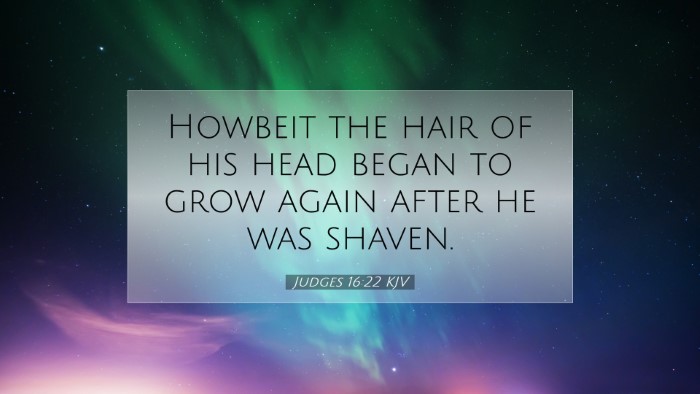Commentary on Judges 16:22
"Howbeit the hair of his head began to grow again after he was shaven." - Judges 16:22
Introduction
This verse, nestled in the narrative of Samson, carries significant theological and moral implications. As one of the final scenes of Samson's life, it marks a turning point that serves as a bridge from his downfall to his restoration. This commentary seeks to draw insights from the works of noted biblical scholars and commentators such as Matthew Henry, Adam Clarke, and Albert Barnes to unravel the depth of this passage.
The Context of Judges 16
The background leading to this verse is essential for understanding its full significance. Samson, the last of the judges, was known for his extraordinary strength and unorthodox lifestyle. His relationships, particularly with Delilah, led to his downfall and eventual capture by the Philistines. His hair, symbolizing his Nazarite vow and strength, was cut, but as verse 22 states, it begins to grow again.
Symbolism of Hair in the Nazarite Vow
According to Matthew Henry, the hair of a Nazarite represents a commitment to God and signifies power derived from divine favor. The cutting of Samson's hair was not merely a physical act but a spiritual devastation, severing his covenant with God. However, this verse provides hope, indicating that restoration is possible after repentance.
Theological Reflections
This verse exemplifies the theme of grace and redemption. As noted by Albert Barnes, the wording suggests that although Samson faced severe consequences due to his sin, God's mercy was still at work. The regrowth of his hair symbolizes the divine opportunity for renewed strength and purpose, underscoring the belief that God can restore what was lost to pride and sin.
Lessons on Human Weakness
Adam Clarke emphasizes that Samson's narrative exemplifies human fragility. His downfall was precipitated by a combination of pride, lust, and disobedience. However, the regrowth of his hair signifies that while humans may fail, God's plans do not falter. It encourages believers to recognize that even in their lowest moments, they can return to God and find restoration.
Restoration and Renewal
The idea of restoration is woven through the entirety of this brief passage. While judging Samson for his actions, it’s crucial to consider that God’s grace allows for recovery and revitalization. Matthew Henry points out that the act of hair regrowth symbolizes hope for the future, signifying that God's calling and gifts may be restored regardless of past failures.
Application for Believers
For pastors, students, and scholars, Judges 16:22 serves as a foundational text illustrating the compassion of God towards His people. This verse challenges believers to reflect on their own lives:
- Reflection on Commitments: Are there vows or commitments we've made to God where we have faltered?
- Understanding Consequences: How do we understand the consequences of our actions in light of grace?
- Hope in Restoration: What steps can we take towards spiritual restoration in our own lives?
Conclusion
Judges 16:22 is a pivotal verse that encapsulates themes of sin, consequence, and the possibility of redemption. It serves as a reminder to all — that while we may stray, our God is always ready to restore and renew us. In the life of Samson, we see a reflection of our struggles and the boundless mercy of the Creator. As we study these insights from respected commentators, may we deepen our understanding of God’s abiding promise to His people, even amid our failures.


